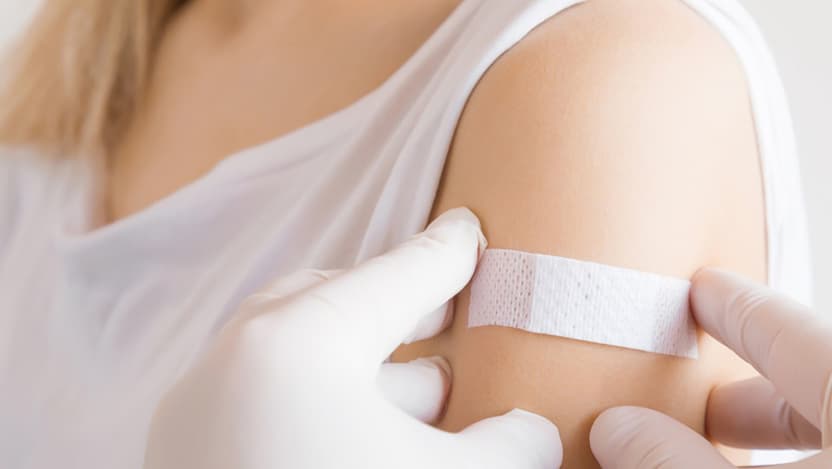Why get the HPV vaccine?

The FDA recently expanded its recommendation for the HPV vaccine, Nita Karnik Lee, MD, MPH, a gynecologic oncologist at the University of Chicago Medicine, to find out more.
What is HPV?
HPV is short for human papilloma virus. HPV is transmitted through sexual (genital skin to skin) contact. It can be passed from person to person even if the infected person has no symptoms. HPV can be cleared by the body, but persistent infections can linger and cause genital warts, abnormal pap smears, and even cancer. HPV is so common that 80 to 90 percent of people will be infected in their lifetime.
What types of cancer are linked to HPV?
Certain strains of the human papilloma virus (HPV) are linked to multiple cancer types and are considered high-risk. The most commonly known cancer is cervical cancer. Cervical cancer affects 12,000 women in the United States annually and over 4,000 women die from this preventable disease in a year.
Importantly, HPV infection with high-risk types is also linked to many other cancers in both men and women including head/neck (oropharynx cancers), anal/rectal cancers, vulvar/vaginal cancers and penile cancers. Over 90 percent of cervical and anal cancers, 70 percent of vulvar/vaginal cancers and 70 percent of oropharynx cancers can be attributed to HPV infection.
What does the vaccine protect against?
The HPV vaccine, approved by the U.S. Food and Drug Administration (FDA) and Centers for Disease Control and Prevention (CDC), protects the uninfected male or female from getting HPV, and thus can drastically reduce or even eliminate cancers associated with HPV. The HPV vaccine is approved for prevention of cervical, vulvar, vaginal, and anal cancers, as well as precancerous or dysplastic lesions and genital warts.
Who should get immunized?
The FDA and CDC recommend the vaccine for use in males and females ages nine to 26. The Advisory Committee on Immunization Practices (ACIP) and CDC recommend all children ages 11 to 12 get vaccinated. Any older adolescents and young adults who have not received the vaccine (boys/men 13 to 21, girls/women 13 to 26) should have catch- up vaccines.
The FDA recently expanded approval for the HPV vaccine to include men and women ages 27 to 45. How can this new group of eligible patients get vaccinated against HPV?
Patients up to age 45 can request the vaccine but would have to check with insurance plans for coverage. Three doses of the vaccine may be $600-800 out of pocket. Importantly, providers can feel safe in prescribing and promoting for interested patients. Next steps to expand coverage under preventative benefits will be for the ACIP and CDC to review and support the extended vaccine age. Though we know the best time to vaccinate is at a younger age, the expansion of the HPV vaccine is an important step in cancer prevention because it will reach those who missed their adolescent vaccines and accelerate our ability to eliminate HPV-related cancers.
What are some barriers to more people getting vaccinated?
Barriers to HPV vaccine include: 1) lack of education of parents, providers and the public about the importance of HPV vaccine for cancer prevention; 2) lack of bundling the HPV vaccine with the other needed childhood/adolescent vaccines, leading to the belief that it was not as important; and 3) prevalent myths that the HPV vaccine promotes early sexual activity or was for those with high-risk sexual behaviors. Studies have debunked these myths and show no such behavioral change. HPV vaccine promotion for boys and men lags yet we know the highest rates of HPV-related cancers are now being seen in men.
What would you say to a parent who is concerned about the safety of the HPV vaccine?
Overall, the vaccine’s safety was originally evaluated in about 13,000 individuals, and the most commonly reported side effects were: injection site pain, swelling, redness and headaches. Since 2006, over 100 million HPV vaccine doses have been distributed with low rates of problems. CDC has carefully studied risks and there is a thorough system in place for reporting any adverse events or side effects. The HPV vaccine is recommended by the CDC and many medical organizations as the benefits for cancer prevention strongly outweigh the low risks of side effects.
What is UChicago Medicine doing to address the problem of HPV-related cancers?
At the University of Chicago Medicine, we are collaborating across disciplines of oncology, gynecology, surgery, and adult and pediatric primary care to both promote HPV vaccination and raise awareness about HPV-related cancers such as cervical cancer, oropharyngeal (throat) cancer, and anal cancers.
We are helping to lead local and statewide conversations about HPV vaccine cancer education and prevention through the upcoming HPV Cancer-Free Illinois Roundtable Event on November 15, 2018. This free one-day event is open to health professionals, patients, advocates to learn more about how we can work together to eliminate HPV-related cancers and increase HPV vaccination rates. To register, Nita Karnik Lee, MD, specializes in the diagnosis and treatment of gynecologic cancers. Her focus is on providing comprehensive and compassionate care to women diagnosed with ovarian, uterine, cervical, vulvar or vaginal cancers.
Nita Karnik Lee, MD, MPH
